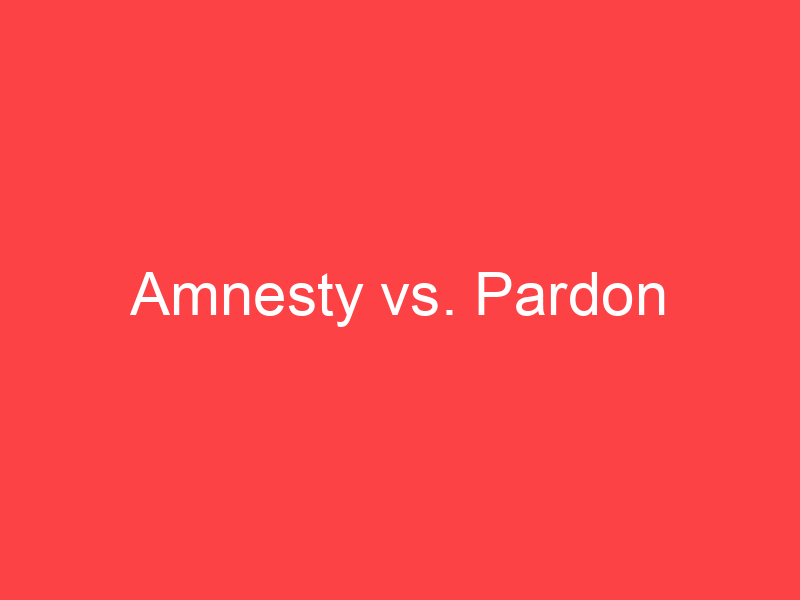Main Difference
The main difference between Amnesty and Pardon is that the Amnesty is a form of pardon which obliterates all legal remembrance of the offense for a class of people and Pardon is a forgiveness of a crime and the cancellation of the relevant penalty
-
Amnesty
Amnesty (from the Greek ἀμνηστία amnestia, “forgetfulness, passing over”) is defined as: “A pardon extended by the government to a group or class of people, usually for a political offense; the act of a sovereign power officially forgiving certain classes of people who are subject to trial but have not yet been convicted.”
An amnesty constitutes more than a pardon, in so much as it obliterates all legal remembrance of the offense. Amnesty is increasingly used to express the idea of “freedom” and to refer to when prisoners can go free.
Amnesties, which in the United Kingdom may be granted by the crown or by an act of Parliament, were formerly usual on coronations and similar occasions, but are chiefly exercised towards associations of political criminals, and are sometimes granted absolutely, though more frequently there are certain specified exceptions. Thus, in the case of the earliest recorded amnesty, that of Thrasybulus at Athens, the thirty tyrants and a few others were expressly excluded from its operation; and the amnesty proclaimed on the restoration of Charles II of England did not extend to those who had taken part in the execution of his father. Other famous amnesties include: Napoleon’s amnesty of March 13, 1815, from which thirteen eminent persons, including Talleyrand, were exempt; the Prussian amnesty of August 10, 1840; the general amnesty proclaimed by the emperor Franz Josef I of Austria in 1857; the general amnesty granted by President of the United States, Andrew Johnson, after the American Civil War (April 12, 1861, to April 9, 1865), in 1868, and the French amnesty of 1905. Amnesty in U.S. politics in 1872 meant restoring the right to vote and hold office to ex-Confederates, which was achieved by act of Congress. Those were true amnesties, pardoning past violations without changing the laws violated.
The Immigration Reform and Control Act of 1986—signed into law by President Ronald Reagan on November 6, 1986—granted amnesty to about 3 million illegal immigrants in the United States.
-
Pardon
A pardon is a government decision to allow a person who has been convicted of a crime to be free and absolved of that conviction, as if they were never convicted.
Today, pardons are granted in many countries when individuals have demonstrated that they have paid their debt to society, or are otherwise considered to be deserving of them. Pardons are sometimes offered to persons who were either wrongfully convicted or who claim that they were wrongfully convicted. In some jurisdictions, accepting a pardon implicitly constitutes an admission of guilt (see Burdick v. United States in the United States), the offer is refused in some cases. Cases of wrongful conviction are nowadays more often dealt with by appeal rather than by pardon; however, a pardon is sometimes offered when innocence is undisputed in order to avoid the costs that are associated with a retrial. Clemency plays a very important role when capital punishment is applied.
-
Amnesty (noun)
Forgetfulness; cessation of remembrance of wrong; oblivion.
-
Amnesty (noun)
An act of the sovereign power granting oblivion, or a general pardon, for a past offense, as to subjects concerned in an insurrection.
-
Amnesty (verb)
To grant a pardon (to a group)
-
Pardon (noun)
Forgiveness for an offence.
-
Pardon (noun)
An order that releases a convicted criminal without further punishment, prevents future punishment, or (in some jurisdictions) removes an offence from a person’s criminal record, as if it had never been committed.
-
Pardon (verb)
To forgive.
-
Pardon (verb)
To refrain from exacting as a penalty.
-
Pardon (verb)
To grant an official pardon for a crime; unguilt.
-
Pardon (interjection)
Often used when someone does not understand what another person says.
“Pardon?, What did you say?, Can you say that again?”
-
Pardon (noun)
the action of forgiving or being forgiven for an error or offence
“he obtained pardon for his sins”
-
Pardon (noun)
a cancellation of the legal consequences of an offence or conviction
“he offered a full pardon to five convicted men”
-
Pardon (noun)
an indulgence, as widely sold in medieval Europe.
-
Pardon (verb)
forgive or excuse (a person, error, or offence)
“I know Catherine will pardon me”
-
Pardon (verb)
release (an offender) from the legal consequences of an offence or conviction, and often implicitly from blame
“he was pardoned for his treason”
-
Pardon (verb)
used to indicate that someone is justified in doing or thinking a particular thing given the circumstances
“one can be pardoned the suspicion that some of his errors were deliberate”
-
Pardon (interjection)
a request to a speaker to repeat something because one did not hear or understand it
“‘Pardon?’ I said, cupping a hand to my ear”

